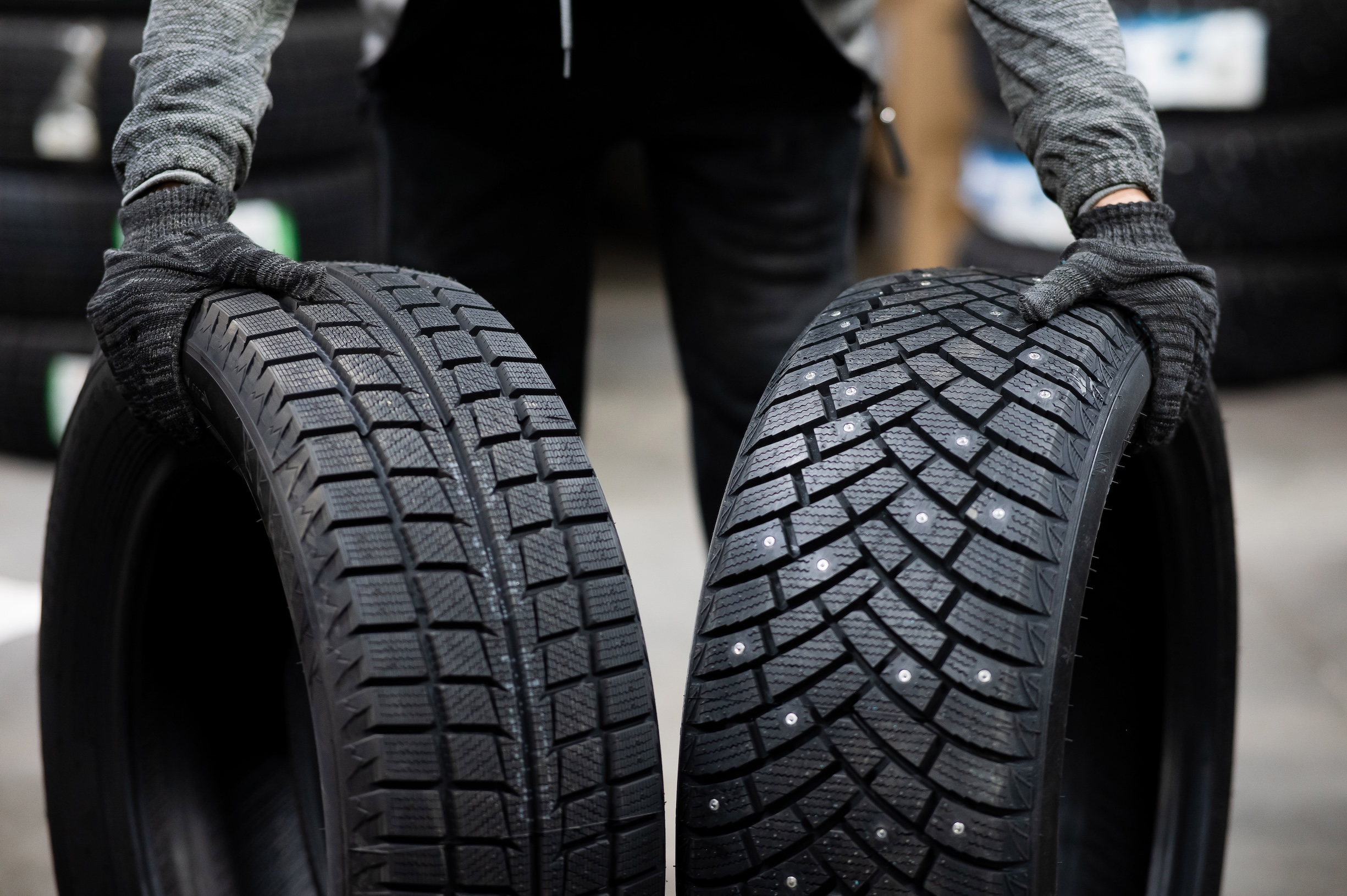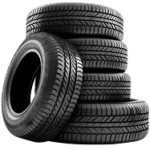Can You Use Winter Tires in the Summer?

As the seasons change and the temperatures rise, many drivers wonder: Can you use winter tires in summer? After all, if your winter tires still have plenty of tread left, it might seem cost-effective to leave them on year-round.
But while it may seem convenient, using dedicated winter tires for summer driving can lead to reduced performance, faster tire wear, and even higher fuel costs. In this blog, we’ll explain why winter tires aren’t made for warm weather, what alternatives are available, and how Telle Tire & Auto Centers can help you switch at the right time.
The Purpose of Winter Tires
Tire manufacturers specially design winter tires, or snow tires, for one thing: cold-weather performance. Their tread patterns, rubber compounds, and overall construction are engineered to provide traction in snow, slush, icy conditions, and freezing temperatures.
Unlike all-season or summer tires, winter tires are made with a softer rubber that remains flexible even when temperatures dip below 45°F. This flexibility allows them to grip the road in freezing conditions, giving you better control and shorter braking distances in winter driving scenarios.
Winter tires also feature deeper tread depths and more aggressive patterns with biting edges and siping. These tread designs help disperse snow and slush and prevent hydroplaning, giving your vehicle more stability during challenging winter conditions.
How Winter Tires Work Differently
When compared to summer or all-season tires, the differences in construction and performance are significant:
- Rubber Compound: Winter tires use a softer, more pliable rubber compound, ideal for cold temperatures. Summer tires are made from a firmer compound that resists heat and provides better grip in dry and warm conditions.
- Tread Design: Winter tires tend to have larger tread blocks and more siping to improve traction in snow and on ice. Summer tires have shallower, streamlined tread patterns optimized for dry and wet pavement.
- Temperature Performance: Winter tires perform best at temperatures below 45°F. In contrast, summer tires are designed for high performance and cornering precision in warmer temperatures.
Simply put, winter tires shine in cold, slick conditions. But once summer rolls around, they become less effective—and potentially unsafe.
Why You Shouldn’t Use Winter Tires in Summer
While it’s technically possible to drive on snow tires in summer, it’s not recommended. There are several reasons why using winter tires in warmer months could do more harm than good for your vehicle and wallet.
Reduced Performance and Safety
The biggest concern with using winter tires in summer is a noticeable drop in safety and performance. The soft rubber compound in winter tires that is so effective in the cold becomes overly pliable in hot weather, causing higher rolling resistance. This results in:
- Sluggish handling
- Longer braking distances
- Less responsive steering
- Poor cornering grip
These performance issues can be hazardous during emergency maneuvers or high-speed driving. According to the National Highway Traffic Safety Administration (NHTSA), proper tire performance is crucial for vehicle safety. So when temperatures rise, your winter tires are no longer doing their job.
Faster Tire Wear
Hot pavement can wreak havoc on winter tires. Their soft rubber compound wears down much faster in warm conditions than a summer or all-season tire would.
If you continue using winter tires in summer, you’ll replace them much sooner than expected, defeating the original intent to “save money” by keeping them on. In many cases, you could cut their lifespan in half just by driving a few months through the heat.
Higher Fuel Consumption
Winter tires create more rolling resistance than summer or all-season tires, especially on dry roads. This means your vehicle has to work harder to maintain speed, ultimately consuming more fuel.
Even a slight increase in rolling resistance can reduce fuel efficiency significantly over time. If you’re trying to save at the pump this summer, switching to a more seasonally appropriate tire is smart.
Noisy and Uncomfortable Ride
Due to their aggressive tread patterns, Winter tires also produce more road noise on dry pavement. While this isn’t a major safety issue, it does make for a less enjoyable ride.
Drivers often report increased cabin noise, vibrations, and a “mushy” feel when taking corners or braking—all of which can be avoided by switching to summer or all-season tires for the warmer months.
Alternatives to Winter Tires in Summer
So, what should you use instead of winter tires in summer? You have a few great options:
- Summer Tires: These are designed specifically for warm-weather performance. They offer superior handling, shorter braking distances, and better grip on dry and wet roads.
- All-Season Tires: A balanced option that performs adequately in most weather conditions, though not as specialized as summer or winter tires. Ideal for drivers who don’t experience extreme winters and want a tire they can use year-round.
At Telle Tire & Auto Centers, we carry many tire brands to meet every driver’s needs. Whether you’re looking for ultra-high-performance summer tires or reliable all-season options, we’ve got you covered. Shop summer and all-season tires now and find the perfect fit for your vehicle.
If you plan to switch between winter and summer tires seasonally, be sure to store your winter tires properly. Our team can assist with professional storage services to help preserve tire quality and free up space in your garage.
Common Questions About Winter Tires in Summer
Can you drive on winter tires in summer?
Yes, you can technically drive on winter tires during the summer, but it’s not advisable. You’ll experience reduced traction, faster tread wear, and poor fuel economy. It’s safer and more cost-effective to switch to seasonal tires.
Are snow tires in summer bad for your car?
While winter tires in summer won’t directly damage your car, they can negatively affect handling, braking, and overall performance. This added strain on your vehicle could lead to more wear and tear over time, especially on the suspension system.
Do winter tires wear out faster in hot weather?
Absolutely. The soft rubber used in winter tires is not built for high temperatures. Driving on hot pavement causes them to degrade much faster than they would in the cold, reducing their lifespan significantly.
What temperature should you remove winter tires?
Experts recommend switching to summer or all-season tires when the daily average temperature consistently stays above 45°F. This typically happens in early to mid-spring, depending on where you live.
Ready to Switch Your Tires?
If you’re still driving on winter tires in the summer, now is the perfect time to change. At Telle Tire & Auto Centers, we make it easy to schedule a tire change, shop for new tires, or access the professional tire services you need.
Whether you need summer or all-season tires installed or help choosing the best tire for your driving needs, we’re here to help. With locations across the region and a wide selection of trusted brands, Telle Tire has everything you need to drive confidently all season.
Make the safe and smart choice this summer. Swap out your winter tires and get the performance and comfort you deserve on the road.

Take it to telle
Stay Safe with a Tire Check from Telle Tire
Worried about your tread depth or tire condition heading into the summer storm season? Take it to Telle. Our expert technicians can assess your tires, check pressure levels, and recommend replacements when necessary, helping you stay in control regardless of the weather conditions. Stay safe, stay prepared, and if you’re unsure about your tires, schedule a visit with your nearest Telle Tire & Auto Centers location today.
Stay Informed
Recent Articles from Telle Tire

What Happens to Your Car When You Delay Scheduled Maintenance
It’s easy to push routine car maintenance down the to-do list. Oil changes, wheel alignments, tire rotations, fluid checks, battery tests, and suspension inspections often feel…

Winter Driving in Missouri: Top 7 Mistakes Drivers Make & How to Avoid Them
Winter in Missouri is anything but predictable. Drivers can experience early-season frost, freezing fog, sudden snow bursts, black ice on bridges, and wide temperature swings, sometimes…

Top Scenic Drives in Missouri This Winter
Winter transforms Missouri into a stunning landscape of snow-covered forests, frosted bluffs, quiet river valleys, and peaceful state parks. Whether you’re near St. Louis or Kansas…
